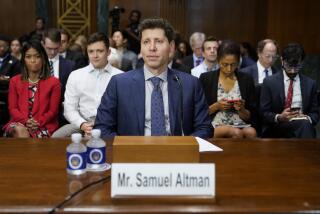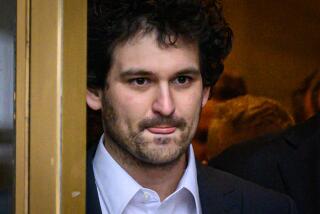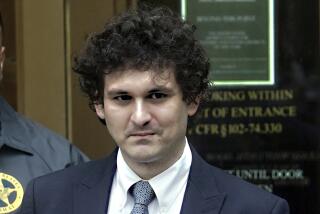Enron Chief Was Warned of Problems
- Share via
WASHINGTON — Enron Corp. Chairman Kenneth L. Lay was warned last summer by a company vice president that the energy company’s financial practices might cause it to “implode in a wave of accounting scandals,” congressional investigators said Monday.
The vice president, Sherron Watkins, complained in an August letter to Lay and other senior Enron executives that a “veil of secrecy” surrounding the company’s “funny accounting” of complex partnerships had not been adequately disclosed to the public and merited further investigation, according to excerpts from the memo.
The seven-page memo was found by investigators sifting through 40 boxes of Enron documents obtained from the company after it filed the largest bankruptcy in U.S. history Dec. 2. The investigators said it raises troubling questions about the extent to which Enron officers and the company’s auditor, Andersen, were aware of the financial transactions and accounting practices that contributed to the energy giant’s fall.
But Robert S. Bennett, Enron’s Washington lawyer, said Lay took the employee’s concerns seriously--and, in fact, met with her and ordered an investigation. He said the review by an outside law firm found that “no further investigation was necessary.”
“This really isn’t fair to the people under investigation,” Bennett said.
Since Enron’s collapse, investigators have alleged that the Houston company used a network of partnerships to mask debt and make its balance sheet appear stronger. In mid-October, the company acknowledged accounting problems relating to those partnerships and slashed shareholder equity by $1.2 billion.
Congressional committees are investigating whether Enron and its auditor withheld information from employees and investors that led to billions of dollars in losses as the company’s stock plummeted.
Investigators said they plan to interview Watkins, whom they declined to name publicly but who was confirmed as the author by her attorney, Philip Hilder.
Watkins worked for Enron Chief Financial Officer Andrew S. Fastow as vice president of corporate development. She wrote the memo anonymously, Hilder said, and then sought out Chairman Lay to express her concerns directly.
“She doesn’t perceive herself as a heroine; she was just doing her job,” said Hilder, who said Watkins had written the undated memo in mid-August. After talking to Lay about it, Hilder said, she asked to be reassigned so she would no longer report to Fastow.
Before Watkins joined Enron, Hilder said, she worked for Andersen--the accounting firm that has come under fire for not sounding alarms on Enron’s precarious financial condition.
Watkins, in her late 30s, still works for Enron in a variety of capacities, her lawyer said. Hilder said she remains on the job because she “felt loyalty to the company.”
“She’s been there for eight years,” he said. “It’s very difficult to just pick up and leave if you have a disagreement.”
The excerpts from her August letter provide a window on an internal debate underway at Enron about the company’s accounting practices before its problems were widely known.
Watkins wrote that she had complained directly to Jeffrey K. Skilling, who resigned as Enron’s chief executive Aug. 14. Skilling has denied any knowledge of the firm’s financial problems.
“Mr. Skilling flatly denies the allegations in the letter related to him,” said Judy Leon, a spokeswoman for Skilling.
The memo was written about the time that Lay was reassuring investors and telling employees that Enron would eventually see “a significantly higher stock price,” according to one Aug. 27 e-mail from Lay released last weekend. Instead, Enron’s stock plummeted as investors grew more concerned about the controversial partnerships. On Dec. 2, the company filed for Chapter 11 bankruptcy protection.
Ken Johnson, a spokesman for the House Energy and Commerce Committee, said the memo “clearly shows that top Enron executives, including Kenneth Lay, were warned of serious financial problems months before the company reduced shareholder equity.”
“What’s also troublesome is that some people may have tried to hide the truth or simply did not want to know it,” Johnson said.
According to excerpts from the memo released Monday, Watkins questioned the company’s accounting methods for numerous partnerships involving Fastow and for other “special purpose” entities.
Fastow was replaced Oct. 24. On Nov. 8, the company announced that it had overstated its profit since 1997 by $586 million.
But as early as August, several senior Enron employees were “consistently and constantly” questioning the company’s accounting methods and use of stock swaps with related entities, Watkins wrote.
“It sure looks to the layman on the street that we are hiding losses in a related company and will compensate that company with Enron stock in the future,” she warned.
House Energy and Commerce Committee Chairman W.J. “Billy” Tauzin (R-La.) and Rep. James C. Greenwood (R-Pa.), chairman of the subcommittee on oversight and investigations, sent letters to Enron, Andersen and the Houston law firm Vinson & Elkins seeking records on their review of the concerns. Tauzin questioned whether Enron officers had instructed Vinson & Elkins not to second-guess “the accounting advice and treatment provided by” Andersen.
The review by the outside attorneys concluded that the concerns did not warrant “further investigation by independent counsel and auditors,” given that they raised no facts that had not either been known or disclosed by company executives and auditors, according to congressional investigators. The firm, however, warned of “a serious risk of adverse publicity and litigation,” investigators said. It was unclear when the firm completed the review.
A spokesman for Vinson & Elkins said the firm is reviewing the request for information.
Separately Monday, Sen. Paul S. Sarbanes (D-Md.), who chairs the Banking, Housing and Urban Affairs Committee, added his panel to the growing list of those looking into the Enron matter.
Sarbanes has asked five former chairmen of the Securities and Exchange Commission to testify at a Feb. 12 hearing that will explore accounting and investor protection issues surrounding the problems with Enron and other public companies, such as Waste Management and Sunbeam Corp.
The panel will include Arthur Levitt Jr., Richard C. Breeden, David Ruder, Harold M. Williams and Roderick M. Hills. A spokesman for Sarbanes said Enron’s collapse, which wiped out the retirement savings of thousands of employees and cost investors billions of dollars, has brought investor protection to the forefront of the legislative agenda.
The senator also asked the General Accounting Office on Monday to investigate how Enron’s employee funds were handled.
The banking committee’s ranking Republican is Sen. Phil Gramm of Texas, whose wife, Wendy, is on Enron’s board of directors.
In another development, Andersen, known until last year as Arthur Andersen, said an Oct. 12 memo sent by the accounting firm’s in-house lawyer “never told the audit team that they should destroy documents for past audit work that was already completed.” Time magazine reported this week that the memo directed the destruction of Enron documents in possible violation of the law.
Congressional investigators were focusing on the memo in the hope it would explain why Andersen had destroyed what they termed a “significant” number of documents related to Enron.
*
Sanders and Simon reported from Washington, and Streitfeld reported from Houston. For background and earlier Times articles on Enron, go to:
www.latimes.com/enron
RELATED STORY
Asset auction: Proposed sale of Enron assets could leave it a small company. C1
More to Read
Inside the business of entertainment
The Wide Shot brings you news, analysis and insights on everything from streaming wars to production — and what it all means for the future.
You may occasionally receive promotional content from the Los Angeles Times.











